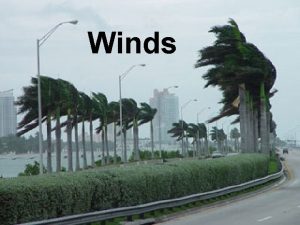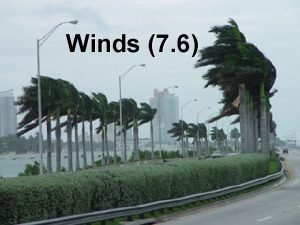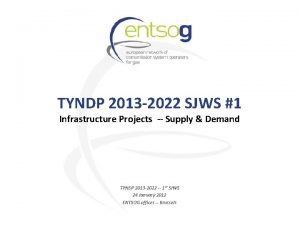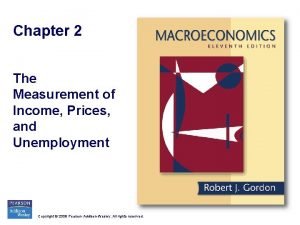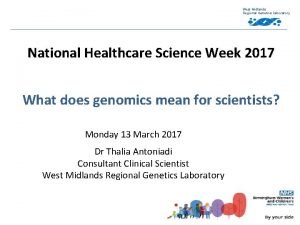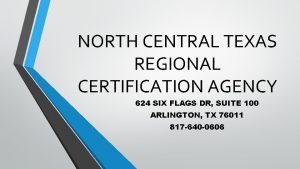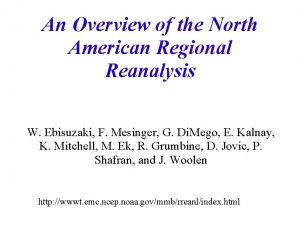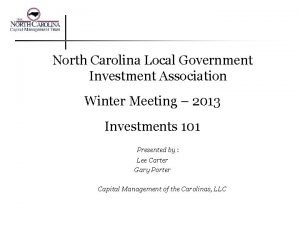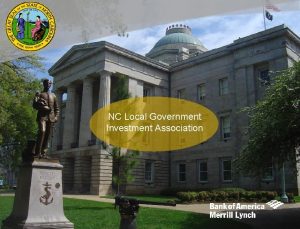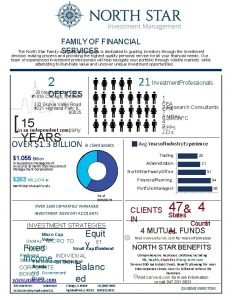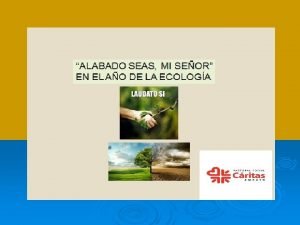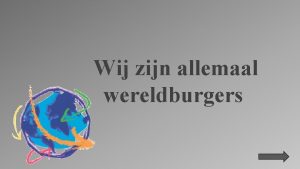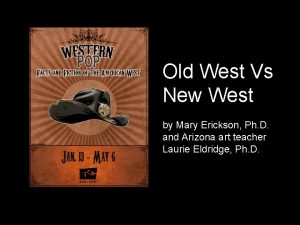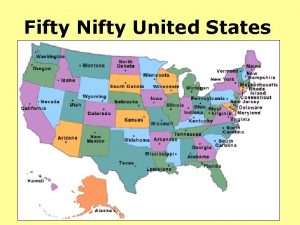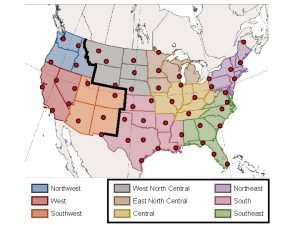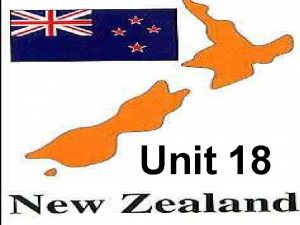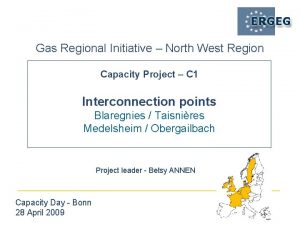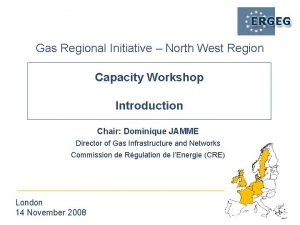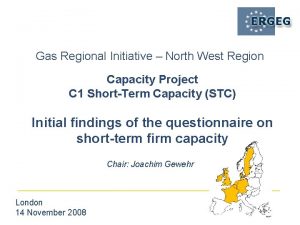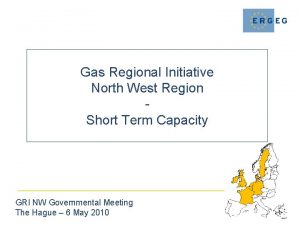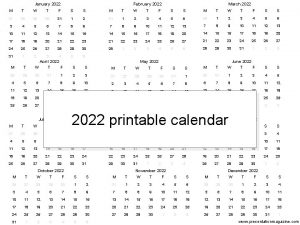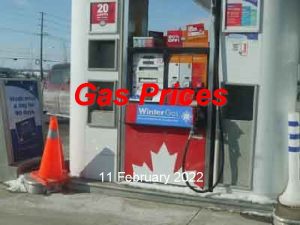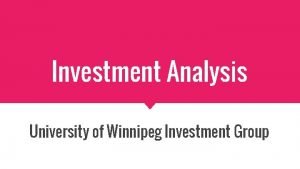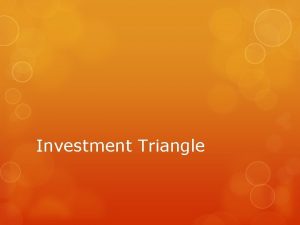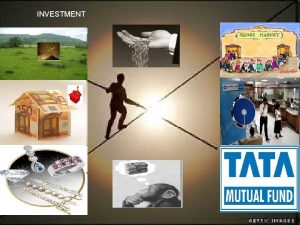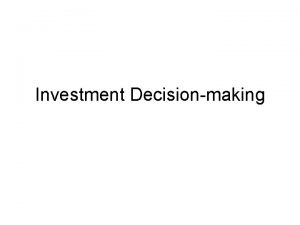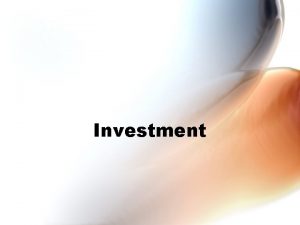Gas Regional Investment Plan North West 2013 2022



















- Slides: 19

Gas Regional Investment Plan North West 2013 -2022 Stakeholder Consultation Presentation 4 th April 2013 1

Consultation Details ¾This presentation informs stakeholders about the content of the North West Gas Regional Investment Plan 20132022 (NW GRIP) Presentation at the GRI NW meeting in the Hague on 4 th April 2013 ¾This presentation will be accompanied by a consultation questionnaire Published on the regional TSOs’, ENTSOG and GRI websites and shall be regarded as the input for the stakeholder consultation ¾Stakeholder Consultation start date 4 th April 2013 ¾Stakeholder Consultation end date 3 rd May 2013 ¾Responses to be submitted to NW GRIP coordinator GTS (see last slide with contact details) 2

NW GRIP 2013: Timeline 23 Nov 12 ¾ GRI NW consultation on concept Early 13 ¾ Start drafting the document 4 th April ¾ Stakeholder Consultation start date 3 rd May ¾ Stakeholder Consultation end date 1 st July ¾ Share draft version with GRI NW 1 st Sep ¾ Deadline for GRI NW response 1 st Oct ¾ Final publication Late 2013 ¾ Post GRIP publication consultation 3

Introduction Why a GRIP? ¾ Third Energy Package legal obligation ¾ Regulation Art. 12(1) 715/2009/EC ¾ Obligation for TSOs to publish a regional investment plan every two years 1 st NW GRIP published in November 2011 ¾ First ever GRIP published from any region ¾ Show infrastructure projects influences cross-border points in the Northwest region ¾ Highlighted strong collaboration between regional TSOs Response to GRIP 2011 consultation round ¾ No direct response to the questionnaire provided ¾ EFET response ¾ RCC response Additional value GRIP 2013 compared to TYNDP 2013 -2022 ¾ Additional element of regional cooperation ¾ Update of project data and 2012 data ¾ More detailed information about TYNDP identified cross-border issues 4

Structure NW GRIP 2013 High level principles ¾ ¾ ¾ Complement ENTSOG TYNDP and ensure consistency with National Plans Build on the inaugural NW GRIP and improve it Improve stakeholder communication/consultation Describe/explain the Region‘s assets & needs Explain why investments in gas transmission projects are required in the Region Describe projects Agreement reached during the Nov. 2012 Copenhagen GRI NW GRIP consultation next NW GRIP to include: ¾ ¾ ¾ Improvements based on feedback received, including RCC recommendations Enhanced regional supply and demand analysis Showing the Impact of projects on cross border points Show procedure and results of regional cross border open seasons / auctions ‘Deep Dive’ into regional congested points as highlighted by TYNDP 2013 -2022 5

Chapters NW GRIP 2013 ¾Executive Summary ¾Introduction ¾North West Specifics ¾Supply and Demand ¾In Depth Review of TYNDP Identified NW Issues ¾Projects ¾Conclusions ¾Annex ¾Project description: more detailed description/visualisation compared to TYNDP 6

Chapter North West Specifics I The capacity developed by gas infrastructure projects directly improves the development of the European internal energy market by enhancing all three aspects of European Energy Pillars. Pillar I Competition ¾ ¾ Decades of collaboration and front runners in promoting competition Resulted in the most liquid hubs in the EU Previous and current Auctions and Open Seasons listed in the GRIP All relevant projects included and elaborated in the GRIP Pillar II Security of Supply ¾ Long history of security of supply, cold spell 2012 cooperation illustrative for the region ¾ Decrease in indigenous production, increase need for imports ¾ L-gas issues up to 2022 only applicable to German situation, covered in German Netzentwicklungsplan and Pentalateral Forum, information to be included Pillar III Sustainability ¾ Gas as the cleanest fossil fuel plays a role in the future energy supply. Gas infrastructure allows for a strong growth in the use of renewable sources (wind/sun), as it can affordably provide the required network flexibility and it can serve for example as a means to store energy. 7

Chapter North West Specifics II This chapter will also outline the various reasons for the need for investment in gas infrastructure in the NW region ¾ ¾ ¾ Sufficient capacity to promote competition Sufficient capacity to guarantee security of supply Substitute decreasing regional production Supply diversification Maintenance projects related to the ageing infrastructure Sufficient network flexibility But also barriers to investment exist, what is needed ¾ A favourable regulatory framework (in the project’s definition, execution and operation phase). ¾ A stable investment climate, ensuring that system owners are incentivised to invest in infrastructure projects and that investors can trust that they have a sufficient return on their investments ¾ A clear political vision, not only on an annual volume base, but also on a daily/hourly capacity base 8

Chapter Supply & Demand The NW GRIP will cover the following Demand based topics ¾Annual Demand for the north west region compared to total EU demand ¾Annual Demand development by country ¾Breakdown of Annual Demand into Gas Fired Power Generation and other ¾High Daily Demand scenarios ¾An example of the Impact of Renewables on Gas Fired Power Generation The Supply aspect of the chapter will look into ¾The North West region’s growing import dependency ¾How regional Supply Source diversification will evolve ¾Infrastructure development of LNG in the region The chapter will provide a wide ranging Supply and Demand outlook for North West Europe *All 2012 figures shown the next charts are based on 2013 forecast data, by the time of publication 2012 data will be available. 9

Chapter S&D: Annual Demand 10

Chapter S&D: Annual Balance 11

Chapter S&D: High Daily Demand The Design-Case scenario is favoured by the TSOs of the NW region, as it is considered the most robust. 2011 data has been used for 2012 in this example, actual data will be available for final publication.

Chapter ‘In Depth Review of TYNDP Identified NW Issues’ TYNDP covers four types of analyses: 1. Resilience assessment (potential investment gaps) Findings for: Denmark, Sweden and Luxemburg 2. Supply dependency assessment (the dependence of some Zones on a single supply source) Findings for Germany (GASPOOL market area), Denmark, TIGF France and South France 3. Network adaptability assessment (the ability of the system to adapt to various supply patterns) No findings in NW region 4. Supply source diversification assessment (the capability of the system to enable its Zones to access different supply sources) Overview included in NW GRIP S&D chapter 13

Chapter ‘In Depth Review of TYNDP Identified NW Issues’: Example Resilience Assessment ¾ Potential investment gaps ¾ Germany, Denmark (and Sweden) TYNDP Project Ellund ¾ ¾ Capacity extension from Germany to Denmark would solve this issue Projects were identified through an Open Season in 2009 FID-project Step 1 increase capacity from Oct. 2014 at a level of 310, 000 m³/h Non-FID project Step 2 increase capacity in 2016 at a level of 500, 000 m³/h Update GRIP 2013 ¾ Step 2 is now also FID ¾ No investment gap 14

Chapter Projects: Matrix The matrix improves regional transparency by showing how infrastructure projects impact border points and vice versa. 15

Annex: Project Details ¾ Based on the project information in the TYNDP ¾ Plus new info if applicable ¾ Plus more graphical information 16

Consultation Questionnaire – Sample ¾ What additional information/analysis would you like to see included in the North West Specifics and/or Supply & Demand chapter? ¾ Do you think that the NW GRIP enhances transparency on projects? If not, please provide your reasoning. ¾ Which chapter, do you think, will be of most interest to you and why? 17

Questions 18

Point of Contact / Response to be sent to Mr. Piet Nienhuis, Gasunie Transport Services P. Nienhuis@gastransportservices. nl +31 (0) 50 521 2854 19
 Winds that blow over short distances are called
Winds that blow over short distances are called Name of the wind series
Name of the wind series 2022-2013
2022-2013 Fixed investment and inventory investment
Fixed investment and inventory investment West midlands regional genetics laboratory
West midlands regional genetics laboratory North central texas regional certification agency
North central texas regional certification agency North american regional reanalysis
North american regional reanalysis Local government investment pool services north carolina
Local government investment pool services north carolina Local government investment pool services north carolilna
Local government investment pool services north carolilna North star investment management corporation
North star investment management corporation Plan pastoral 2022
Plan pastoral 2022 Zuid oost west noord
Zuid oost west noord East is east and west is west
East is east and west is west Old west vs new west
Old west vs new west Frederick dobson middleton
Frederick dobson middleton Southwest asia and north africa map
Southwest asia and north africa map World map north south east west
World map north south east west The meeting of longitude and latitude lines
The meeting of longitude and latitude lines 50 nifty united states
50 nifty united states Fifty united states
Fifty united states
